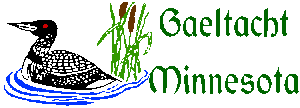
Quick Links
 |
Quick Links |
|
| GaelMinn Home | Dates: schedule, events | All Class | Tools | Amusements | ||
|
10/04//15 |
Classes |
Last Class | Previous Class | Archive Section |
You should still come to class. Wes has some health issues to address, but we'll do some of the combined class work you have already seen in the last couple of weeks, so don't let your Irish get rusty, keep coming to class!
An archive of basic handouts is available.
On the 16th we put my class and Mary’s together and had a fun, productive time.
We went through a list of words that differ only in their use of síneadh fada.
We also covered the basics of question words, as well as which forms of ‘is’ or ‘bí’ come after them.
Wrapping up, I went around the room asking “Céard é / iad seo?”, while showing pictures.
Each person answered using “sin é / iad…”
Lá Fhéile Páidrig Sona Dhaoibh and I’ll see both classes in my room again this coming Monday.
On November 24th we reviewed Buntús Cainte lesson 29, and finished our year off with lesson 30.
I also kept piling on the vocabulary.
bain — extract, get out, harvest, mine
baineann — extracts
ag baint — extracting, etc.
bhain — extracted
bainfidh — will extract
an toradh — the fruit, product
na torthaí — the fruit, products
an toraidh — of the fruit, product
na torthaí — of the fruit, products
fliuch, fliucha, níos / is fliche - wet
ó — from;
ón — from the singular
ó na — from the plural
óna — from his, her, their
uaim — from me
uait — from you
uaidh — from him, it
uaithi — from her, it
uainn — from us
uaibh — from you guys
uathu — from them
bain sult as rud / sult a bhaint as rud
enjoy something
bain áit amach / áit a bhaint amach
reach a place, destination
bain le rud / le rud a bhaint
touch, have to do with, interfere with, concern, relate to something
We looked at the last phrase in more detail, in this handout.
I’m going to alter the format a bit here, as I’m going to assume you know which forms of the verb I’m giving you: imperative, present habitual, verbal noun, past tense, and future tense. Same goes for the nouns, adjectives and prepositional pronouns. I’ll give you the meaning, but remember which forms I’m giving you.
oscail, ag oscailt, d'oscail, osclóidh — open
dún, ag dúnadh, dhún, dúnfaidh — close
bialann, bialainne, bialanna, bialann — restaurant
leabharlann, — library
amharclann, — theater
pictiúrlann — cinema
The -lann ending, which makes these nouns feminine, means each of them is declined in the same way.
grianmhar, grianmhara, grianmhaire — sunny
greannmhar, — funny
gránmhar — full of grain, e.g. an ear of corn, or land
The -mhar ending, which makes these adjectives masculine, means each of them is also declined in the same way.
chuig — toward
chugam
chugat
chuige
chuici
chugainn
chugaibh
chucu
Another form of this preposition, ‘chun', is used to mean “in order to,” in other parts of Ireland. In Conamara a construction with ‘le’ is more common.
Bain chuig rud
start doing something.
Bain chugat anois!
Off with you now!
A bheith go maith chuig rud.
To be good at something, e.g. math
To be good for something, e.g. a cold
ceiliúir, ceiliúrann, ag ceiliúradh, cheiliúir, ceiliúrfaidh — celebrate
an maisiúchán, na maisiúcháin, an mhaisiúcháin, na maisiúchan — decoration
geal, geala, níos / is gile — bright
trí — through
trí an, but more often ‘tríd an’ — through the, singular
trí na, but sometimes ‘tríd na’ — through the, plural
trína — through his, her, there
tríom, tríot, tríd, tríthi, trínn, tríbh, tríothu
a bheith (fud fad) trína chéile
to be (all, completely) mixed up, confused
Bhí mé trína chéile ag an scéala.
I was upset by the news.
We also did a couple of activities to round out our last classtime before Christmas Dinner on the 15th.
See you back at Central on the 12th of January
Comments and questions are welcome via e-mail